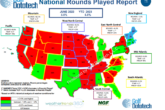At the PGA Merchandise Show, it was announced that the promising initiative to introduce benchmarking to the golf industry with Sagacity, when announced in 2021, has ended due to “financial constraints.” That is hard to believe, considering the average salary of the Top 10 PGA of America executives in 2021 was $979,421.
This is the second failed attempt by the PGA of America to implement industry benchmarking.
Previously, the PGA of America supported an initiative titled PGA PerformanceTrak. Unfortunately, the number of respondents fall from 2,350 to 1,959, 1,695, and 957 in 2011, 2012, 2013, and 2014, respectively. As a result, in January 2020, the PGA of America announced the discontinuation of this valuable service.
The PGA of America, with its resources, could not get widespread adoption. The service was FREE to members, and those PGA Professionals who participated received continuing education credit.
This is disappointing but unfortunately not unexpected. Why are the participation rates of the golf course so low?
Sadly, the cause is a lack of sophistication of many golf course owners as small business entrepreneurs. Because their livelihood is dependent upon the cash flow generated by the course, they hold a false belief that protecting their “trade secrets” is beneficial. In contrast, throughout the hospitality industry, vital operational benchmarks are shared for the collective welfare of the industry.
Management companies are also very resistant to participating in national benchmarking studies. To provide a platform on which their owners might review their performance causes great angst. This narrow-minded thinking continues to restrict golf courses from being professionally managed.
Implementing such a system is like a term paper; it is very iterative. While many golf course owners and managers would like to have comprehensive comparative data locally, the innovators and the early adopters quickly become frustrated with the results as they produce sample sizes too small to be meaningful. So, do you publish survey data indicating general national trends, hoping those reviewing the report will be motivated to participate in future surveys, or do you give up?
The solution to creating meaningful data depositories is readily available. It would be simple to implement, but because of parochial boundaries and defined territories, it is not likely to occur in the short- or intermediate-term.
There is resistance to benchmarking not only within the United States but also in Europe. In February 2013, a benchmarking tool shown below was introduced by the R&A. Titled “Course Tracker,” its goal is to accomplish the following:[1]
- Monitor, analyze, and evaluate your course’s progress.
- Identify where your business can be made and save money.
- Track income and expenditure and plan for the future.
- Generate illustrated reports to help you make informed decisions.
- Anonymously benchmark with other similar courses in your country.
Highlighting the difficulty of obtaining course participation, the R&A abandoned this reporting service within four years.
The good news is that using benchmarks will outperform your direct competitors’ financial returns, increasing your customer loyalty and ultimately gaining a significant market share advantage.
Hopefully, Pellucid, another private firm engaged in benchmarking, and Sagacity will succeed long-term, with or without industry support.
[1] https://www.coursetracker.org (Link no longer active)

Matt Holder
Benchmarking data can be so helpful and I don’t see any downside to sharing your data. Each course is unique and the benchmarking data will help build stronger facilities, which reinforces the local golf community to the benefit all courses.
Mike Loustalot
We at Sagacity are disappointed that the PGA of America chose not to continue the program, but we appreciate their effort. We will continue to provide free service in 2024 for any course using a tee sheet offering an automated collection of data (foreUP, CPS, Lightspeed, ClubCaddie). We will onboard others at a nominal $99 per month.